Early years
I started learning piano at the age of seven, taking lessons from my uncle, an accomplished church organist. I continued with lessons for a couple of years, before taking a break, resuming music when I went to secondary school. Some good friends of my parents ran an orchestra in Stratford-upon-Avon, and their timpanist was in his final year at my school when I started. I must have expressed an interest because suddenly I was being taken to rehearsals and he taught me how to play. I have never been overly tall, but in my early teens I was so skinny that ‘a grown-up’ in the orchestra used to have to get the timps out from where they were stored and put them away when the rehearsal was finished.
Alongside starting to play classical percussion, I resumed my piano lessons, and also started to play the oboe, which I continued with throughout secondary school, eventually passing my Grade 8 exam. Our school had a small core of musicians within it, and as I could play something, I was immediately drafted into both the orchestra and choir. Outside of school, I joined the local Saturday morning orchestra, the local wind band, and at around 16, the Warwickshire County Youth Orchestra.
My parents bought me my first drum kit when I was about 15 – a second hand Autocrat, which looked something like this. Instantly I was a celebrity at school, by virtue of actually owning a set of drums. To be honest, I was a pretty poor kit player at this stage, only ever having played classical percussion, but I knew the basic rock beats, and started playing along with records and tapes at home, the drum heads dampened with masking tape.
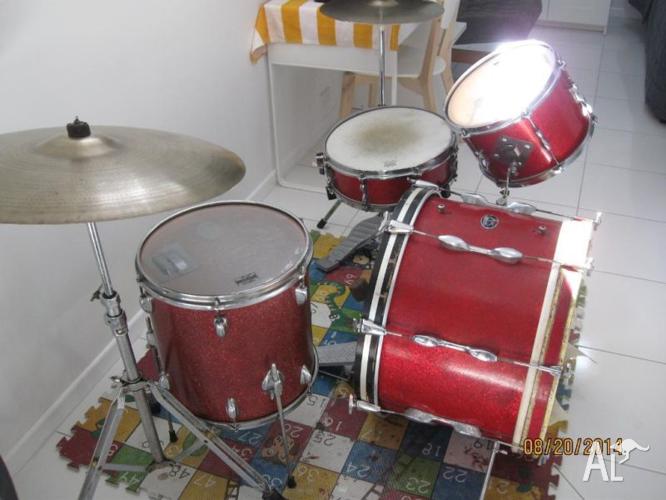
When I was in the sixth form, some school friends who also played in the orchestra decided that they would like to start a group playing 20s and 30s music. I’m a bit hazy as to why we settled on this genre, but eventually the band coalesced into ‘Trunnian’, consisting of drums, double bass, clarinet, violin, banjolele, and my brother on flute. Being the only non-classical ensemble within the school, we found a grudging acceptance by the establishment, and for a couple of years were regular players at school functions, such as fetes and coffee mornings. Bizarrely, I can remember the gestation of the band name. A Monty Python sketch featured a band called “Toad the Wet Sprocket”, and as teenagers in the 70’s we found this hilarious. We decided to call our band “Frog the Dry Trunnion” in homage to it, swiftly shortening the name to “Trunnion” .
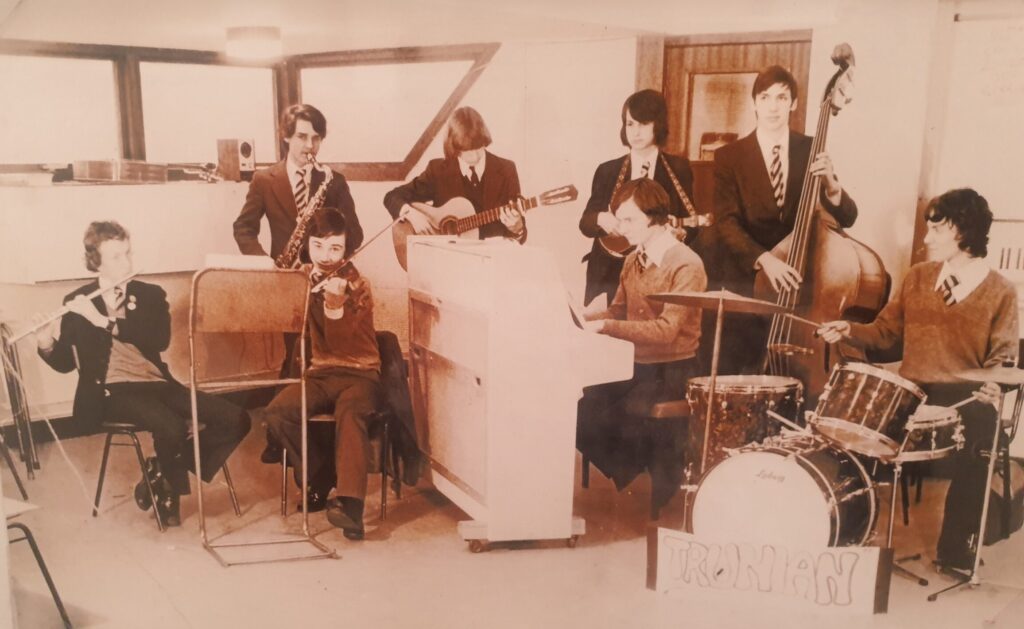
Along side my foray into the world of Palm Court music, a friend from primary school got in touch to say that he was putting a rock band together, and did I want to play drums? He played bass, and his friend from school not only played electric guitar, but also had an actual amplifier! We started practicing on Saturday afternoons, and I recruited the Trunion’s banjolele player, who also was an accomplished guitarist. Playing exclusively covers, we chose the name “Lush Pal”, which I remember as being anagrammatic, but of what, I’m not sure.
My secondary school was a very traditional single-sex state grammar school (there was still eleven-plus in Stratford in the 70s) and in a nod to the modern times, the sixth form were allowed to have occasional ‘record-evenings’ where we essentially ran our own disco, with the added incentive that this was a joint operation with the girls’ grammar school. The ‘record evening’ of Spring 1976 was enlivened by the first public performance of ‘Lush Pal’, a name that is anagrammatic, but of what I’m not sure. This was such a success that we played our second, and final gig at the record evening Spring 1977, shortly before A-levels, and the end of my school career.
Leeds College of Music
By the time I left school, I had become so heavily involved in playing music that Music College sounded like a perfect option, and I selected Leeds because at the time it was the only music school that offered a non-classical option. The Graduate Diploma in Light Music (now recognised as a degree equivalent) allowed for studying Percussion with Drum Kit, or Drum Kit with Percussion. Knowing that my kit playing was still fairly basic, but confident of my timpani and tuned percussion ability, I selected the former, and passed the auditions, arriving in autumn 1977 to start studying. Leeds in the late 70s was a fascinating place for someone coming from rural Warwickshire. The punk boom was exploding, and there were opportunities to see live bands everywhere, often for free. The Polytechnic (now re-branded as Leeds Metropolitan University) hosted regular gigs, and I got my first experience of ‘proper’ rock concerts, with an eclectic selection of bands performing. I remember seeing the Boomtown Rats, X-Ray Specs, the Undertones, Wilko Johnson, the Gang of Four, and many others in the first year.
LCM was very jazz and funk orientated, and in order to get some wider experience, and also to improve my lamentable kit playing, I looked around for bands to play with outside college. At that time, there were several independent music shops in Leeds, and each one boasted a notice board filled with bands looking for musicians. “Drummer wanted, must be fast” sticks in my mind, an obvious indicator of the punk boom, and the principal requirement of a drummer at the time!
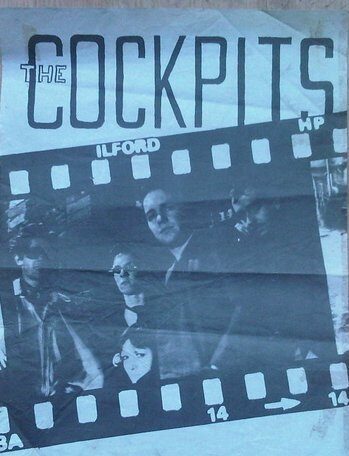
Answering one of the less specific adverts lead to me meeting a couple of guys, Tom and Andy, who would become life long friends, and also start my acquaintance with the local music scene, which has continued throughout my life. Tom spent some time producing a now legendary ‘band musical tree’ which has an intricate interweaving of bands and musicians as they developed within the Leeds music scene. We formed my first ‘proper’ band, The Cockpits, a punk band which hd a short lived run, before we split into two separate bands, myself and Tom forming ‘The Neighbours’, which was bit more mainstream, whilst Andy carried on in a more hard core punk band The StaPrests”.
I carried on playing with Tom in various incarnations of The Neighbours, eventually morphing into The Rapidos, with my friend Ian from LCM on electric violin. I also played in a couple of other bands. Most performances were thankfully never captured on film, but here is a rare photo of me in full ‘mod’ mode.
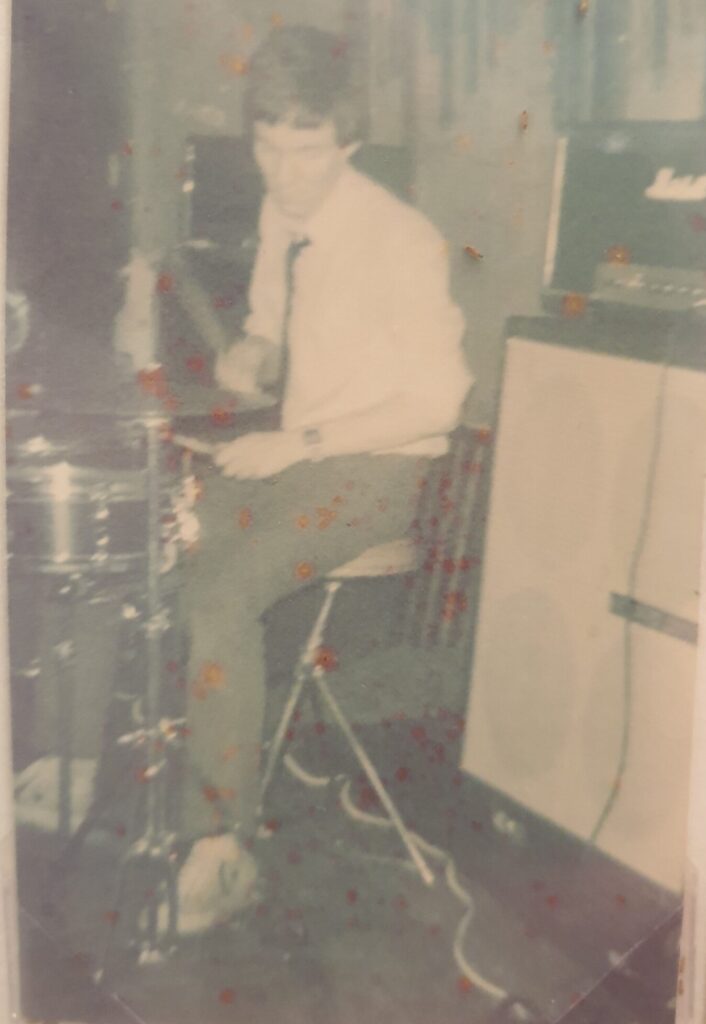
Aside from playing within college, which included jazz ensembles, big bands and a symphony orchestra, I also discovered the working mens club scene. My grant allocation was woefully inadequate, and this was the days before student loans, so the only option was to earn some money somehow, and if I could do that playing, that was all to the good. Every working men’s club in Leeds had a resident organist and drummer, and the Evening post (Leeds’ local newspaper) had a classification in the ads – “Bands and Musicians Wanted.” It wasn’t long before I found a club looking for a drummer, and I started playing 3 nights a week – Friday, Saturday and Sunday. The money was pitiful, and to add insult to injury, the drummer got paid half of what the organist got, as “you don’t need to read music”. The playing was mainly backing visiting artists, singing 60s and 70s covers, interspersed with background music in-between bouts of bingo, which was what the whole entertainment was based around. Although at times soul-destroying, regular performing started to have a marked effect on my kit playing.
One of the coveted gigs in Leeds was a pub on Roundhay Road, which had an organist and drummer 5 nights a week, with a mixture of paid artists, and ‘Free and Easy” evenings, which are now recognisable as Open Mic sessions. The organist was an experienced player, who was also quite into jazz, and when a college friend of mine decided to give up the gig, I got the opportunity to take it on. Not only was the money better than the club gigs, the audience were a lot friendlier, and crucially, I could now play 5 times a week. I was there for nearly two years, leaving when I graduated from LCM in 1981. In all that time, my kit never came home. I set it up on a Wednesday, covering it with a dust sheet each evening, and packing it away when I finished on a Sunday. Smoking bans in pubs were not even considered in the early 80s. I still use the ride cymbal from that kit, and I can still smell the stale smoke engrained into it!
The Eighties – getting `a ‘proper job’
I graduated from LCM in 1981, having also obtained a LRAM Performance Diploma in Percussion from the Royal Academy of Music. I had decided by now that a career as a full time musician was not for me. LCM was something of a hot-house environment, and very competitive. I had seen brilliant fellow students in years above me graduate and then struggle to make a loving, and thought that there was no way that I could make it as a performer. My experience in the clubs had made me realise that I didn’t want to do that full time, so in order to broaden my options, I took a one year Post Graduate Peripatetic Teaching Course at Bretton Hall College of Education (now the West Yorkshire Sculpture Park), emerging with a Graduate Certificate in Education.
This year had several advantages. Firstly, it came with a full grant, and so I didn’t have to worry about supplementing my income playing in the pub, and secondly, it put off having to decide what to do for a job when I left college. Its’ fair to say that at the time, I was fairly dismissive of the whole endeavour, although it did make me a qualified teacher. However, I have subsequently realised that I did learn a lot there about presentation skills, how to impart knowledge, and other techniques that I now regularly make use of in my instrument and theory lessons.
When I graduated from Bretton Hall in 1982, now a qualified teacher with actual experience in teaching in schools in class and one-to-one lessons, I once again had to decide what I was going to do with my life. Ian, my fiddle playing friend from LCM, who has become once of my closest friends, had been busking in Europe the year before, and suggested that I join him and another player. We worked up a small but unique set of Bach pieces with our combination of twin fiddles, and myself playing the continuo part of glockenspiel. It sounds mad, but it worked really well, and we busked in and around Leeds to raise the money for our trip. As an aside, this led to my one and only time in a place cell, as we were arrested playing outside the Schofield Centre in the the centre of Leeds. An apologetic constable informed us that the council had insisted on a clampdown on all street entertainment, and as such we were rounded up, and spent a worrying couple of hours in the police station. Thankfully, the case was thrown out by the magistrate who eventually heard it, obviously irritated that court time had been wasted pursuing three classical musicians. The ‘absolute discharge’ meant that my temporary police record disappeared, and thus my background remained clear.
The busking trip led to us spending six weeks in Europe, travelling in my ageing Ford Cortina and my home built trailer. I could write a book just detailing our experiences, but we got back in September without any profit, but we had supported ourselves and had had some adventures.
Returning to Leeds, as the busking trip had not led to riches, I had to find a job. Nine months driving a bread van was an interesting life experience, which I followed by working for another nine months as sound engineer in a night club, the revolving stage turning three times a night to reveal the house disco band who performed 45 minute sets of 80’s covers. Turning 25 in 1984, I realised that I had to find a ‘proper’ job. The country had recognised that there was a developing skills shortage in IT, and TOPS (Training Opportunities Scheme) were available in ‘Computer Programming’. My experience of computers was limited to a couple of weeks with a Sinclair Spectrum borrowed from Ian while I was in hospital with appendicitis. A good friend who was an un-employed Classics graduate, completed the 12 week course which lead to finding a good job with a software house. I decided to give it a go, and after having somewhat surprisingly passed the quite gruelling assessment, started and finished the short course with the Control Data Institute. Part of the course’s objective was to help place us with an employer, and I found a position as a Trainee Programmer with a small software house, ironically based in Otley, where I would return to live in later life, and which would become a major part of my musical life. This lead to a career in IT which I have continued with throughout my working life.
The Eighties – Bands and Music
Although I become a full time computer programmer in the 80’s(now more glamorously known as a Software Engineer), I continued to play in bands in and around Leeds.
Vandals in Africa was a spin off from an earlier band with my friend Tom. In true 80s style, we were experimenting with backing tapes, and decided that we would play as a three piece, with drums and bass on a backing tape. I played keyboards and percussion, and we gigged in and around Leeds. This picture is one of very few from that era (I’m the one on the left).
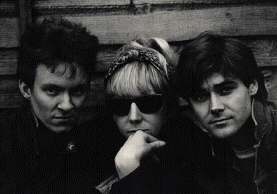
Before long the backing tapes were replaced by a real drummer and bassist, and we continued in this format for several years. Vandals morphed into a band called the Pearl Divers, where I concentrated on playing keyboards, with a newly purchase DX11.
By the end of the 80s, I had almost stopped playing drums, and was known mainly as a keyboard player. As well as the Pearl Divers, there were several other combos that I played with regularly, but as the decade drew to a close, I was starting to work away from home more and more, and reluctantly had to give up being in a ‘regular band’. The Pearl Divers acquired another keyboard player, and I continued to play with them on percussion when I was in Leeds – and if not, they did it without me!
The Nineties – return to drumming
After a few years working in Europe, the mid nineties found me in London, and a chance meeting led to me being introduced to a group of doctors at the Royal Free Hospital who had a jazz band, and were without a drummer. Following a one off gig with them, I joined The Jazz Academy, and started to rehearse with them every Wednesday night at the Royal Free. Through their various connections, we enjoyed some unique gigs, with a lot of functions and dinner engagements. Some of the most memorable include playing at the Royal Festival Hall, Cafe de Paris (Knightsbridge), the British Embassy in Dublin, and a week’s long cruise in the Caribbean. Although I moved back to Leeds in 1996, I carried on playing with them regularly until we finally decided to stop in the early 2000’s.
As you can see, we dressed quite formally for the Jazz Academy gigs ! If you want to know more about the Jazz Academy days, click here.
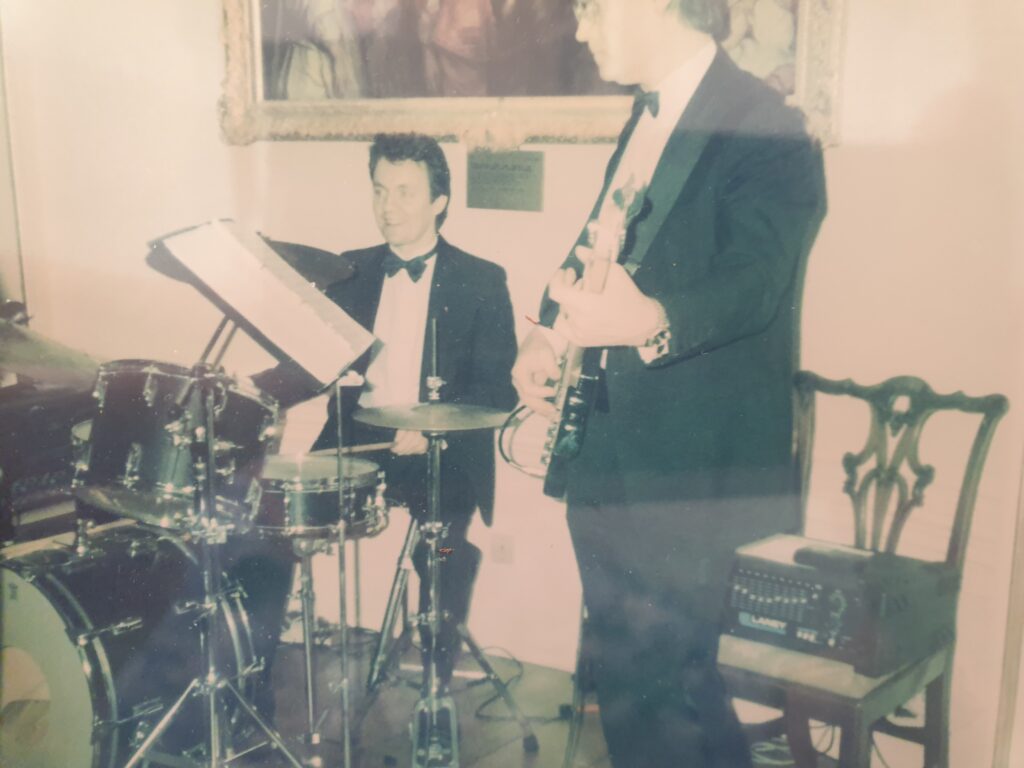
The Noughties – more drumming
All through the nineties, I had been a software contractor, working in various locations in Europe and the Uk. This made playing with a regular band difficult, although the Jazz Academy did everything they could to allow to carry on playing with them until we decided to end the band.
By this time I had decided to stop travelling and had started working with a software house in Leeds. A small advert in a music shop in Ilkley led to me joining Bayou Gumbo, an Otley based Cajun band that I would play with for the next 10 years.
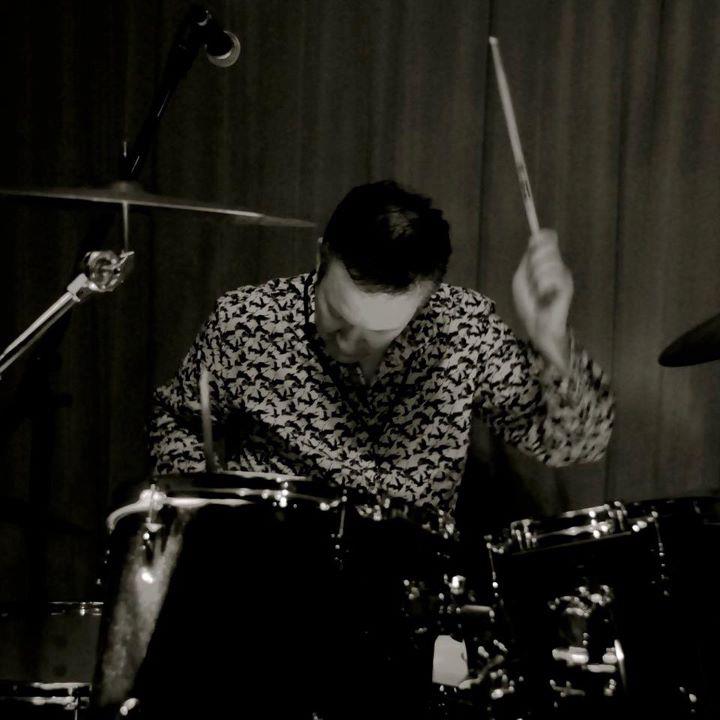
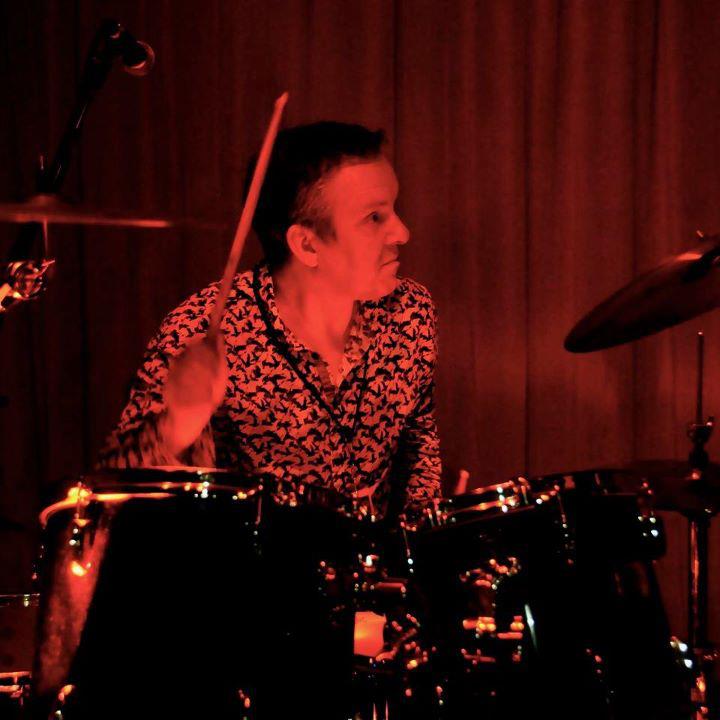
‘The Gumbos’ were a well established band whose drummer had just decided to leave, and were looking for someone who wasn’t ‘just another rock drummer’. I knew the bass player from my days playing in Leeds, although he was surprised to find that I played the drums, and not keyboards! Despite this, I still joined the band, and did countless gigs with them for the next 10 years the decade, in and around Otley and Leeds. My parents came to see us one night when they were visiting from Warwickshire, and I remember my dad commenting when we finished “I suppose you have roadies to pack up?” I wish ….
One of our regular gigs in the year was the Saturday night headline at the Otley Folk Festival, and one of the rare photos above, of me behind the kit are from one of those performances.
I was also captured in the one and only time I have ever played cajon in public when we decided to do an ‘unplugged’ set one year.
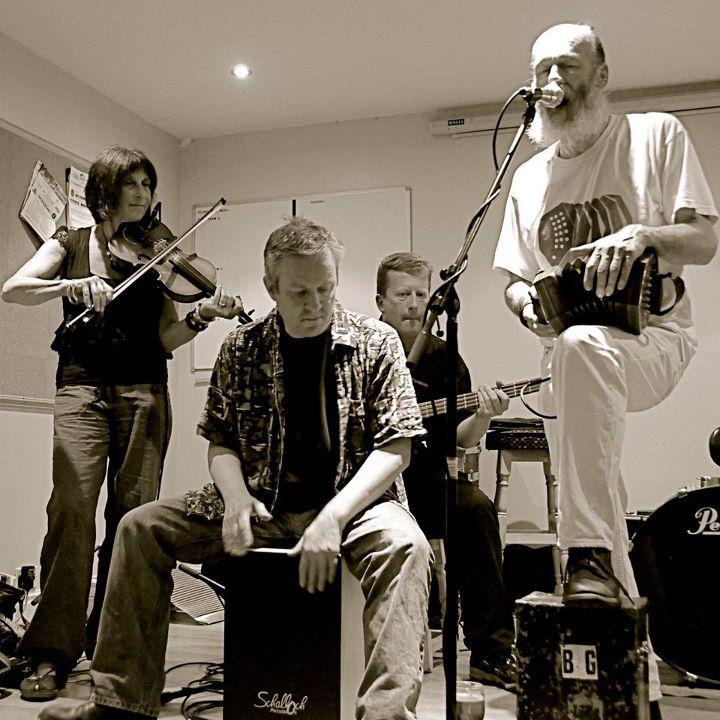
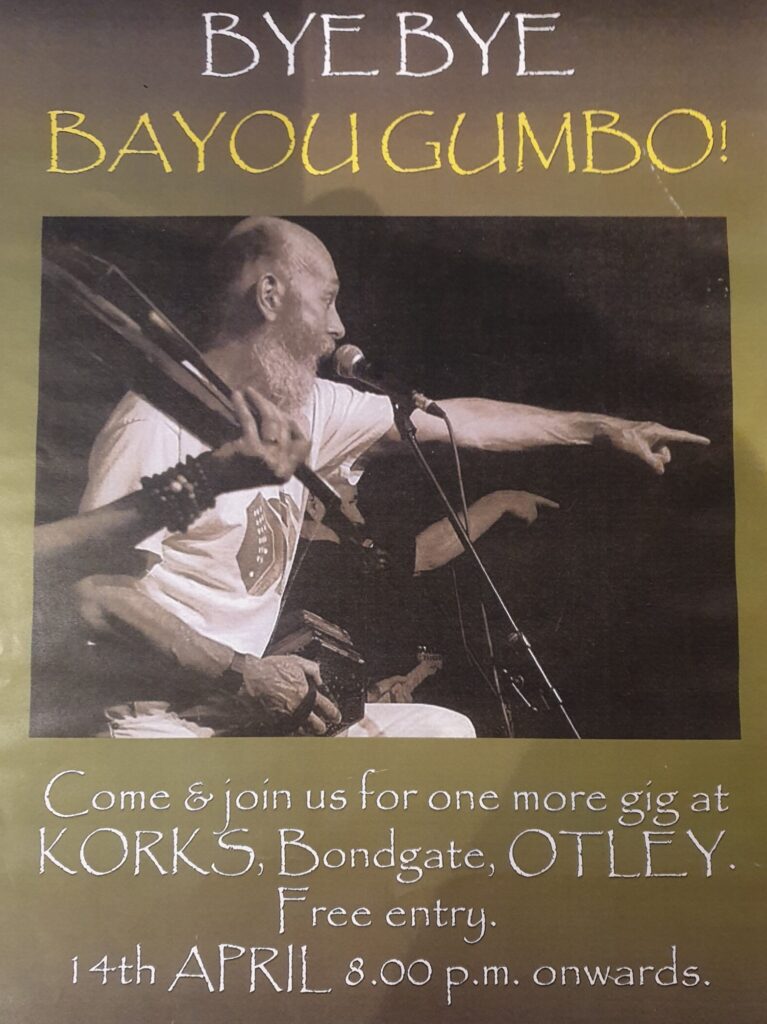
Our final gig was at the famous Korks in Otley. We always played the late Saturday night show there for the folk festival, and it was fitting that we should bring the band to an end there.
(Although this was the official final gig with the Gumbos, Im glad to say that the band still occasionally performs in the ‘classic line up’, with my predecessor Hugh Gumbo on drums).
The Gumbos used to rehearse in Otley Courthouse, and one evening in 2007 I spotted instruments being taken into the main hall. Enquiries led to the realisation that this was Otley Brass Band preparing for a rehearsal. It subsequently transpired that they were without a percussionist, and had bought a new drum kit with the intention of attracting someone to play it. This coincided with my moving to live in Otley from nearby Ilkley, and so some what grudgingly I agreed to come to next week’s practice and audition.
My experience of brass bands was almost non existent, although I had played with a wind band at school, and I was expecting some sort of Salvation Army marching band, and quite frankly didn’t expect to go along more than once. I couldn’t have been more wrong. The band were welcoming, the music was interesting, and a return to reading percussion scores, which I hadn’t done for over 20 years. Best of all, they band helped to set up the kit, pack it away, and carry it to the store room!
I have remained with the band ever since, including a stint as conductor in 2021 when we returned from Covid restrictions.
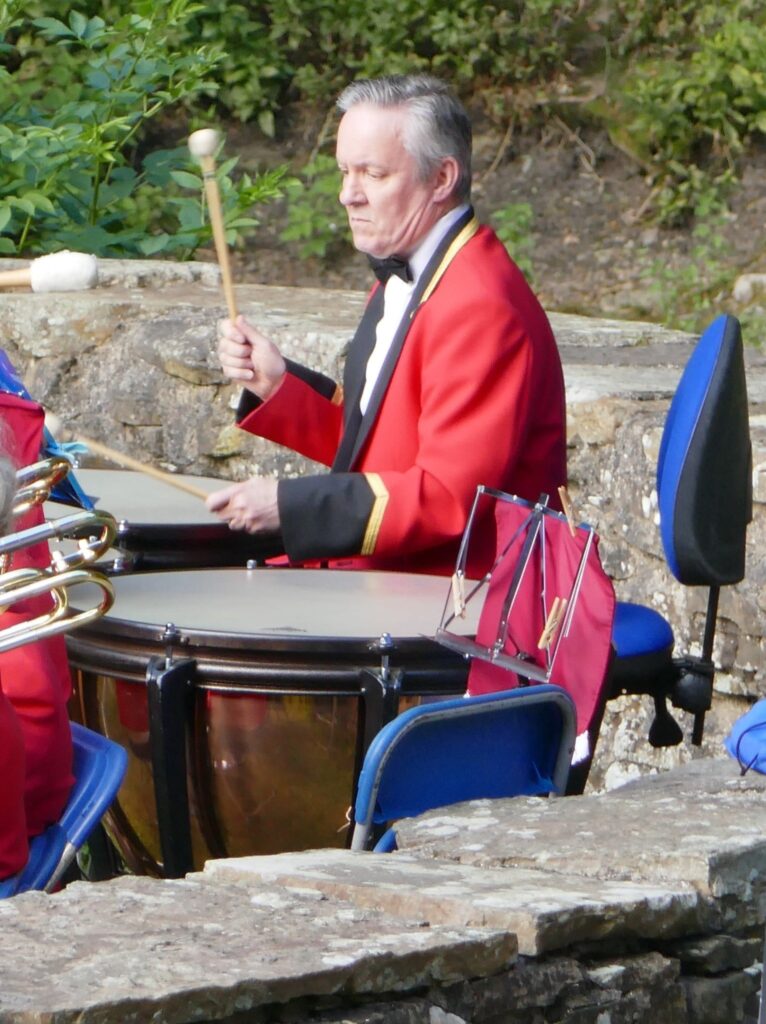
Discovering Bluegrass
In the early 2000s, Ian (my best friend from college who I still saw regularly) announced that he had returned to violin playing after a 15 year absence. He told me that he had discovered this genre called ‘Bluegrass’, and when we went on our annual skiing trip, he spent the entire week playing CDs of this music to us. To be honest, I wasn’t that impressed – a lot of it sounded the same, and it turned out they didn’t even use drums!
In 2006, he rang me up to say that he was coming to a bluegrass festival in a place called Silsden, which was only about 5 miles from where I was staying. I didn’t really have any interest in buying a ticket, but it turned out that there was a free Open Mic concert in the afternoon, so I went along. The next day, he came to our house for lunch and told me that he had this idea for a tuition website, but was surprised how much he had been quoted for building it. After confirming that it was a reasonable quote, I added that this was just the sort of thing that I did as a day job. This led to me becoming involved with setting up the Bluegrass College, a subscription website that allowed members to play along with recordings of bluegrass standards specially recorded by leading players at slow, medium and performance speeds. There were also mixes with individual instruments removed so that the members could play along, as if they were in the band.
The site was a great success, with thousands of members joining over the years. It has now been eclipsed by sites such as Artist Works, but still remains as a free site, with the tuition videos available via YouTube.
Through my association with the site I started to meet members of the bluegrass community, and when I found out that I was precluded from playing drums or keyboards, decided to learn a new instrument, settling on the banjo. I went along to the famous Sore Fingers Summer School (confusingly held at Easter) as a beginner banjo player, and was hooked.
Three years later, I was still a banjo owner rather than a player, and quite frankly couldn’t face the thought of another week with a room full of banjo players. I had played some bass guitar in my youth, so managed to borrow an upright bass and went along as a novice bass player. This was one of the real light bulb moments of my life. I had always wanted to play an instrument that I ‘held’ rather than at arms like, as is the case with drums and keyboards. I seemed to have an affinity with the instrument, and I have played it as my main instrument ever since.
Bluegrass is an aural tradition, with almost nothing notated – when anything is written down, it is nearly always limited to chord charts, either using numbers or chord names. I had always struggled with learning music without music – one of the great benefits of a classical musical education is that you tend to become good at reading music, but the downside is that it is so easy to play that way, there’s no need to play by ear.
I resolved that with my bass playing, I would not write anything down when I learnt songs, unless it was absolutely necessary – for example playing something as a one off, our at short notice. It turned out that this was a great way to improve my aural comprehension. I had done quite well with this at music college, and now I found that I was able to hear and remember chord sequences far easier than in the past.
Sore Fingers
It wouldn’t be right not to include something about Sore Fingers, which has been a significant feature of my musical journey in the last 15 years. There are two courses a year, a full week at Easter and a shorter weekend one in October., and you can find out more about them on there website at sorefingers.co.uk. They bring in well known American tutors for the Easter course, and I have been fortunate enough to have had classes with Missy Raines, Eric Thorin, Mark Schatz, Tod Philips and Greg Garrison, amongst others. I had dealt with some of these players through Bluegrass College, as several of them had recorded with us, but to meet them in person was a real honour.
One of the features of Sore Fingers is evening elective sessions, and an online discussion led to me suggesting that I ran a Basic Music Theory course one year, and the core content of that course is available on my Music Theory page. This was the start of my returning to teaching, and a realisation that I had actually learnt some very useful things during my time at LCM and also in my Post graduate teacher training! I have given the course every year since then, gradually becoming more involved with Sore Fingers, to the point where I have been on the full time teaching staff since 2022.
Playing the bass
You have probably heard the joke:
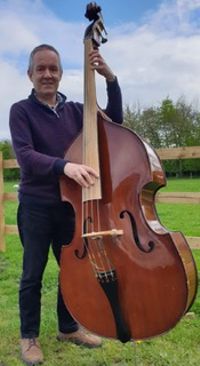
I gave a guy a bass lesson last week – taught him to play I, IV and V. He didn’t turn up the next week, but I saw him a few days later.
“Where have you been, man?”
“Don’t need any more lessons, I’ve got a gig”
My own experience wasn’t far off that! Although I was a beginner bass player, I wasn’t a beginner musician, and knew all the theory of chords. As a drummer, I was aware of the importance of playing in time, ands it wasn’t long before someone asked me to play with them. Bass players are always in demand it seems, especially in bluegrass!
My first band was Cowbaby, with a couple of friends from Sore Fingers who also lived in Yorkshire, and had already been playing together as a duo. I played with them for a couple of years, which included my first festival performances at Didmarton and Coastline festivals.
There was a well known monthly bluegrass club in Leeds at The Grove pub, which alternated between having bands and an Open Mic. They also ran a separate slow jam, which I started going to on banjo, and then graduated to bass. Again, I discovered that bass players are always welcome, and it wasn’t long before I was being invited to play in the Open Mic sessions with some of the members. The organiser and his son, Kevin and Neil, were in a well known UK bluegrass band, but the other members didn’t live near Leeds, and so one month, I was invited to play with them at The Grove on one of the club nights. They have now become really good friends, and I currently play in a band with them and other regulars from the bluegrass club, which we have called The Grove Band, in homage to the pub where we met.
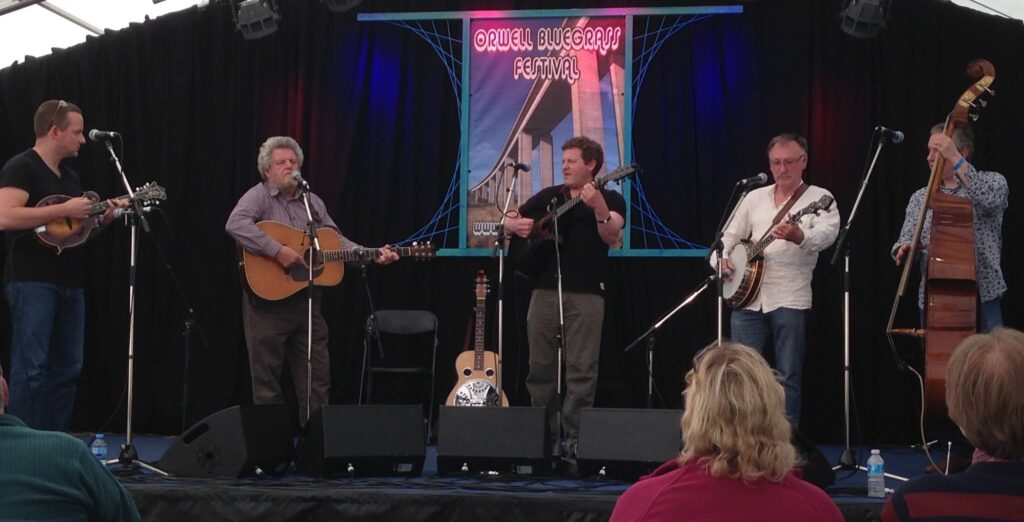
Otley, where I live, has a vibrant folk and acoustic music scene, and Neil also lives here. We started playing together at gigs in the town, and it wasn’t long before we were regularly meeting on Friday nights at the Open mic in The Manor (now sadly closed). Before long we had formed a band with two others, which I mostly used to describe as “Otley’s Favourite Americana Quartet” on our posters (we were of course Otley’s only Americana Quartet ..).
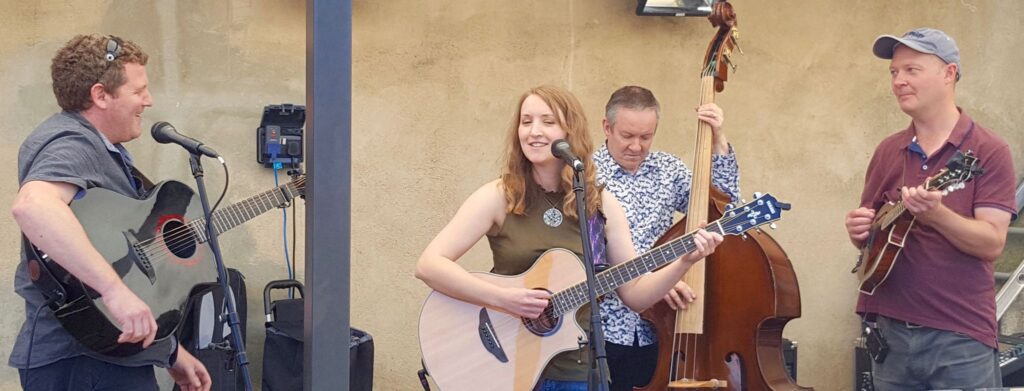
Lost Loui continued up to the Covid pandemic, and we played many gigs in and around Yorkshire, as well as appearing at Orwell Bluegrass festival in 2018.
Rocky Grass
I was told “you have to hear bluegrass played in the states.” I was somewhat sceptical, but in 2010 (when I was still a banjo owner!) went to the Rocky Grass Academy and Festival in Colorado. This was like a US version of our own Sore Fingers, but in the Rocky Mountains rather than a public school in the UK. It was a superb experience, both the quality of teachers (many of whom also have been to Sore Fingers), and also the experience of being surrounded by people who had grown up with this music. There is a hard to define subtle difference in the way bluegrass is played in the states, and of course, it is the home of Americana.
One of the uniques features of Rocky Grass is the ‘band scramble’ where students are formed into bands, and then have 24 hours to work up 2 songs, to be played the next day. It’s a knockout competition format, with the winners of the two heats performing on the final evening of the Academy. I returned in 2011, and have been a further six times, always taking part in the ‘scramble’, even getting to the final on a couple of occasions (but never winning).
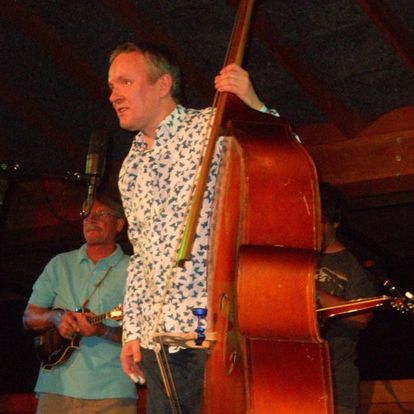
What do I do now ?
I still play with the Otley Brass band, mostly on drum kit, although I occasionally conduct if our regular conductor is unavailable. The majority of my playing otherwise is on the double bass, and I usually find myself playing in Otley at least once a week, either in a session, a band practice or at one of the Open Mics.
I play regularly with Kevin and Neil in The Grove Band, and am currently also playing with Neil in a modern country band (The Holly Charlotte Band), and a folk band (April’s Aunt, formerly Carfare).
I have started to return to teaching, and in 2023 have taught at both the Easter and October Sore Fingers, in addition to building up a list of private pupils who I can teach at their home, online, or in my own studio.
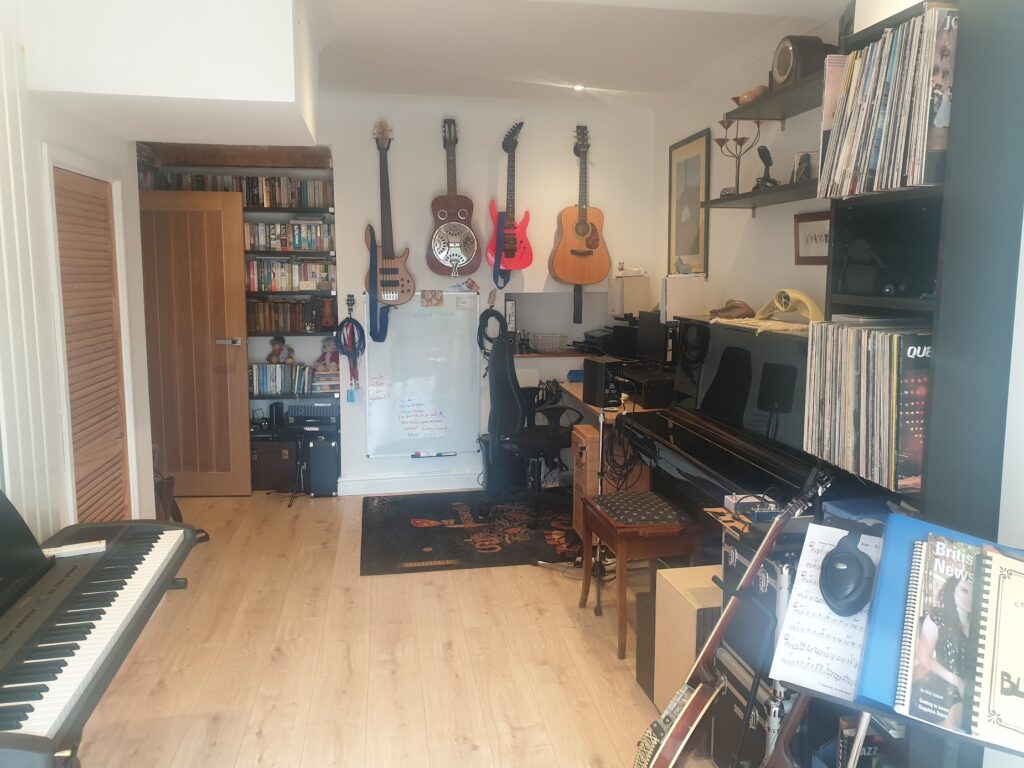
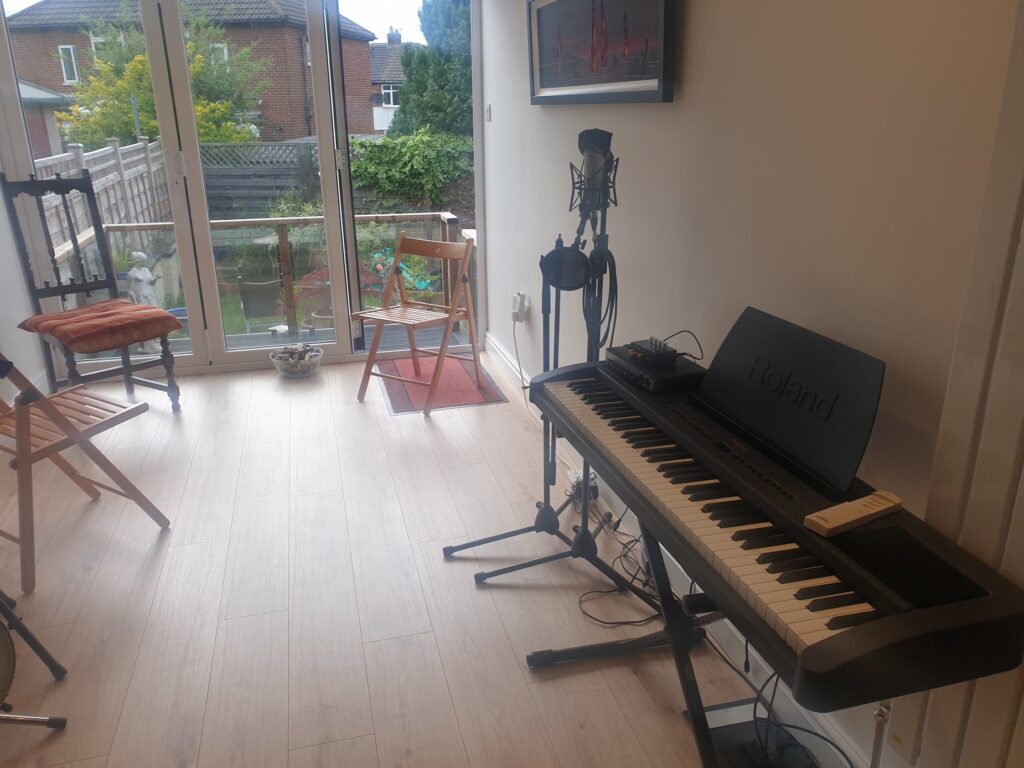
History
1977 – 1982
- The Cockpits (Drums)
- The Neighbours (Drums and Bass)
- The Rapidos (Drums)
- Alternative Dance (Drums)
- Hunslet Catholic Club (resident drummer)
- The Gipton Pub (resident drummer)
- LCM Symphony Orchestra (Principal percussionist)
1982 – 1990
- The Pearl Divers (Drums, Keyboards, Percussion)
- The Postcards (Drums)
- Tiffanys Night Club (Sound Engineer)
1991 – 2000
- Jazz Academy (Drums)
2001 – 2007
- Bayou Gumbo (Drums – continued until 2011)
2007 – 2019
- Otley Brass Band (Drums – continued to present day)
- Cowbaby (Double Bass)
- Braxton Hicks (Double Bass)
- Lost Loui (Double Bass)
- The Grove Band (Double Bass)
2020 to present
- Otley Brass Band (Drums)
- Holly Charlotte Band (Double Bass)
- The Grove Band (Double Bass)
- April’s Aunt (Double Bass)